There they were, swimming along, not far from the boat – a pair of puffins.
Our group leaned over the side or stood on toes, craning our necks to catch a glimpse. But there was no real need as the couple swam around us, seemingly happy to lap up the attention.
We had just cast our lines into the sea off Ireland’s Eye, an uninhabited island in Howth Harbour, home to many species of nesting birds. Aside from the puffins, there are guillemots, gannets, razorbills, fulmars and gulls. Grey seals are plentiful, as are our prey – mackerel.
What has “landed” (excuse the pun) Irish Country Living in this situation? The opportunity to “catch and cook” with Howth Cookery School in Dublin. The school itself is in the original 18th century kitchen of Howth Castle. On arrival, I am greeted by chef Sarah Hughes, slathering butter on to fresh bread roles and piling thick slices of belly bacon on top. A plate of pastries and a welcome hot coffee appear in front of me, and answering my questions, she effortlessly welcomes the other guests while continuing to pack those rasher rolls for the trip ahead.
Catch and cook
The cookery school mainly does classes for the public but also private and corporate groups. Today’s adventure, “catch and cook”, is half fishing, half cooking. In simple terms: “We will go out for a couple of hours around the bay and hopefully we’ll catch something” but shrewdly Sarah tells me: “If not, we have backups in the fridge.”
Sarah has done lots of different things. “I’ve worked in cafes and restaurants, I’ve taught in other cookery schools. I am from Limerick and spent all my summers in Kerry. So I have a huge grá for fish and all things sea-related. I do nearly all of the fish classes. Howth is a fantastic place for fish, a proper working port, it’s not window dressing,” she explains.
Ethos
The ethos is to teach home cooks to cook better. “We want to get people cooking and keep people cooking and doing new things,” she says.
In relation to the type of “student”, Sarah says: “You never know who is coming in so we have learned over the years to develop recipes that some people can do little bits of and can get help and then more technical chefs get an opportunity to do things from scratch. For the majority, it’s very much a social thing. It’s great fun and we try to keep it that way.”
Who attends? “It’s interesting,” Sarah responds. “All the stereotypes aside, your barbecue classes – lots of men, your fish classes – lots of men. Any of the curries or beers classes – lots of men. Groups of women come along to the Spanish or French food classes and then the Vietnamese and sushi classes, we find young people come along too.
“We use as much Irish food as we can, meat and fish always but we get as much of our vegetables from local organic producers as we can, but it can be hard. It doesn’t work all the time for seasonality. But people are understanding it [seasonality] more. We work menus for spring, summer, autumn and winter. That’s what the customer demand is for. The customer doesn’t want to be cooking with strawberries or doing light dishes in the middle of winter. That’s when they want comforting food.”
With time pressing on us and the bacon rolls done, I ask Sarah what we are hoping to catch? “We’re not really sure with the time of year – but that makes it a bit exciting. But oh God, we’d love mackerel.”
To sea
On the boat, the atmosphere is as Sarah predicted “good craic”, and over a local Hope beer (we have the Grunt) and a satisfying bacon sandwich, we toast each other’s success. Such is this catching prowess that Sarah and David Doyle, our skipper, start the filleting process on the boat. The two hours fly by, as does the aforementioned bird life.
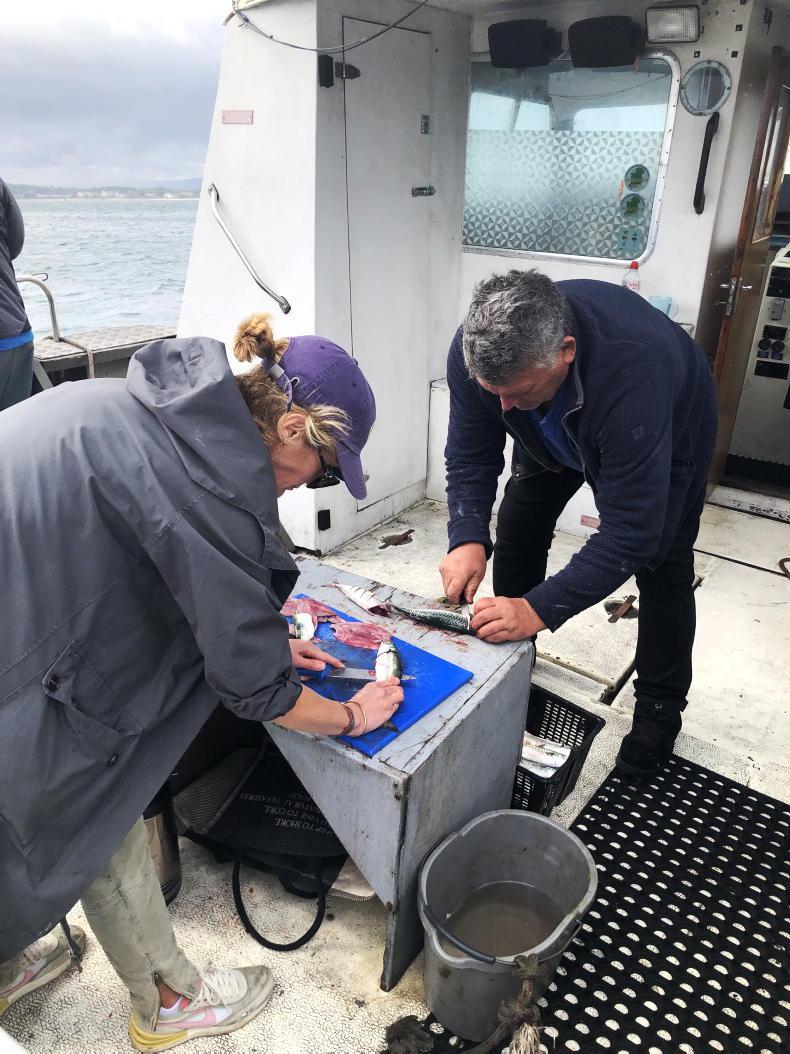
Chef Sarah Hughes and skipper David Doyle start to fillet the fish on board Davids charter boat.
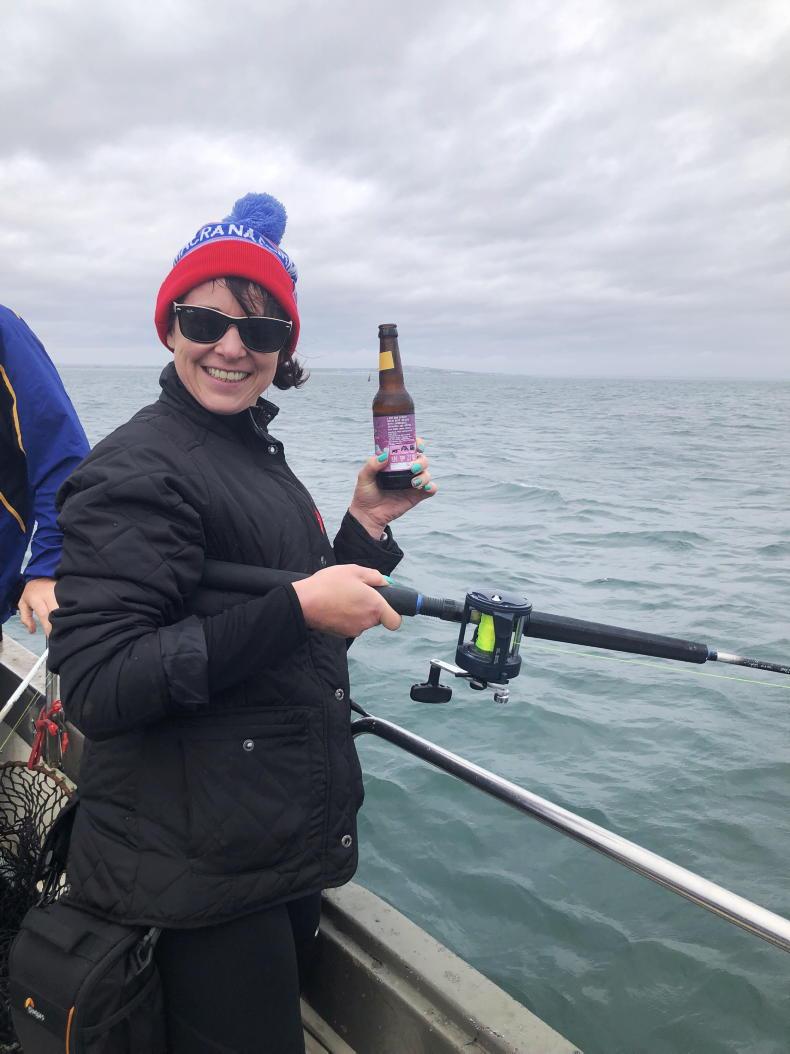
A beer on board: local brew Hope Grunt beer was the drink of choice on board (there was also coffee but ...)
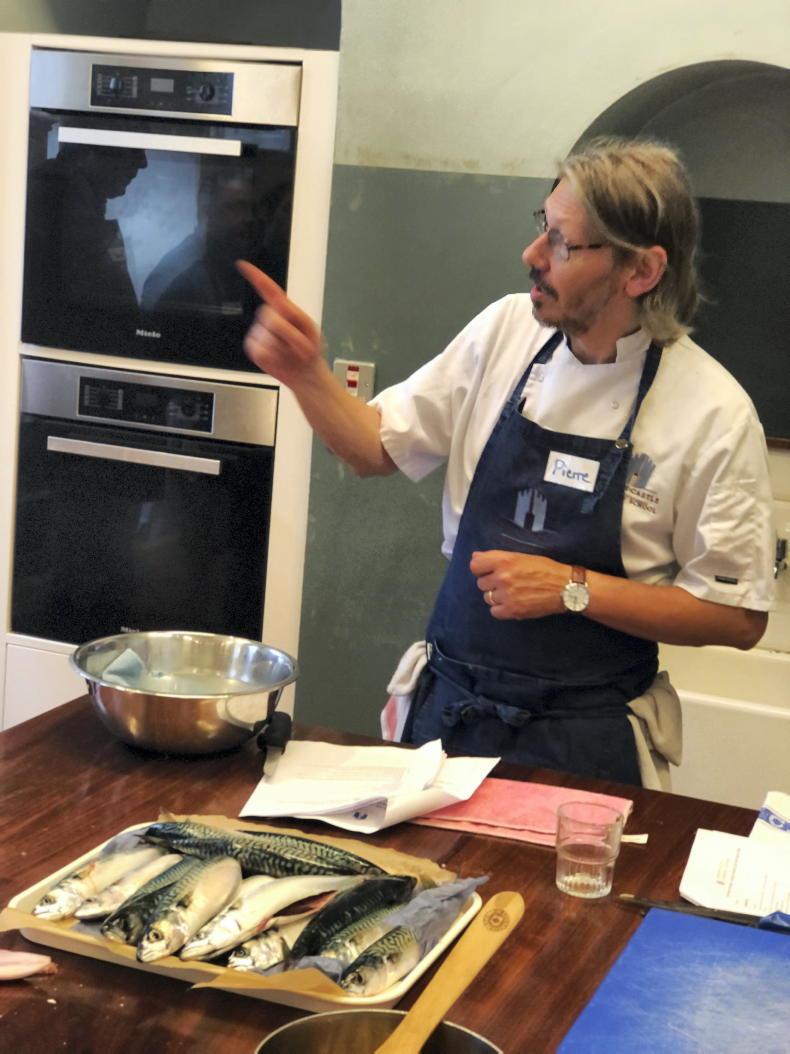
Pierre Heyraud showed us how to fillet our mackerel
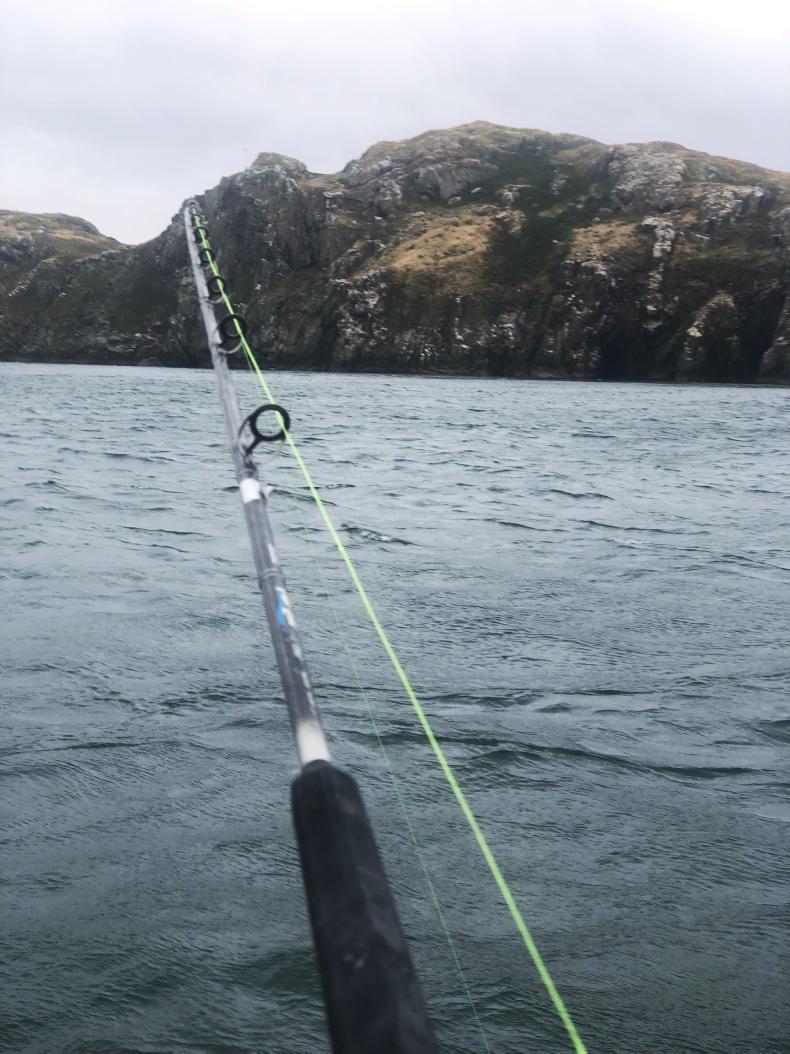
Casting a line near Ireland’s Eye in Howth Harbour.
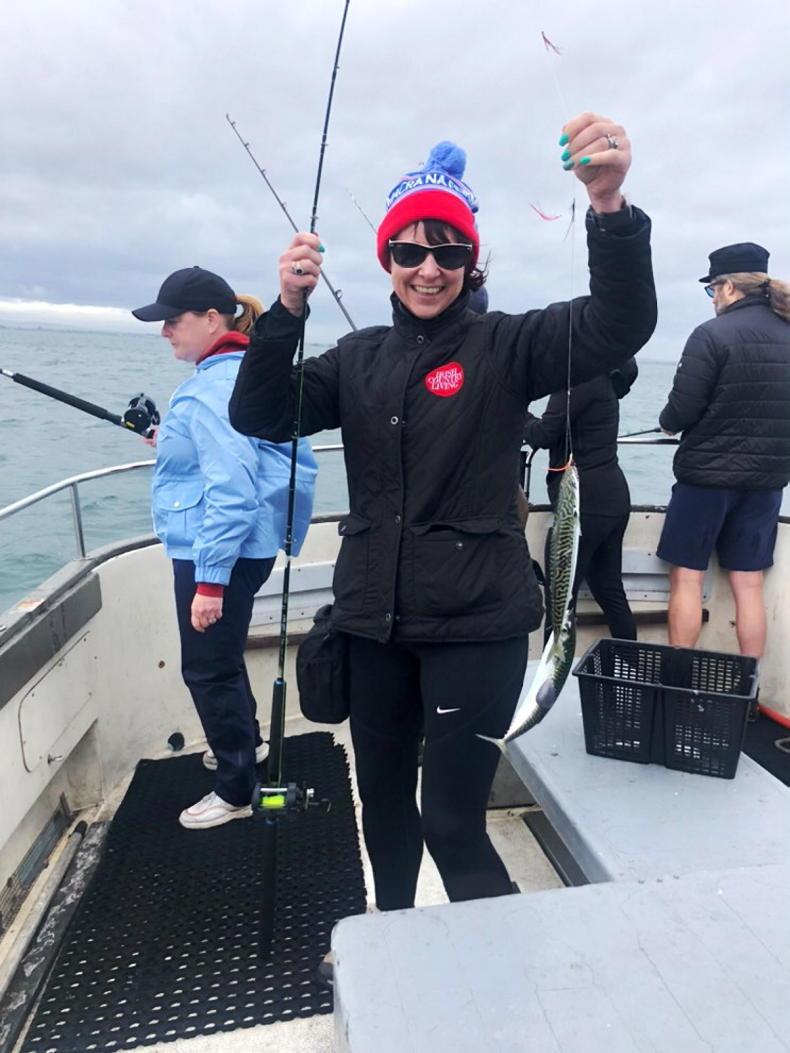
The first catch of the day was very exciting for Amii Mckeever but so many more followed.
Before long, we are back in the cookery school and Sarah hands us over to expert tutor, and no nonsense chef, Pierre Heyraud, who takes us through the menu. Paired off in groups of two in the grand kitchen, there is no rush or hurry.
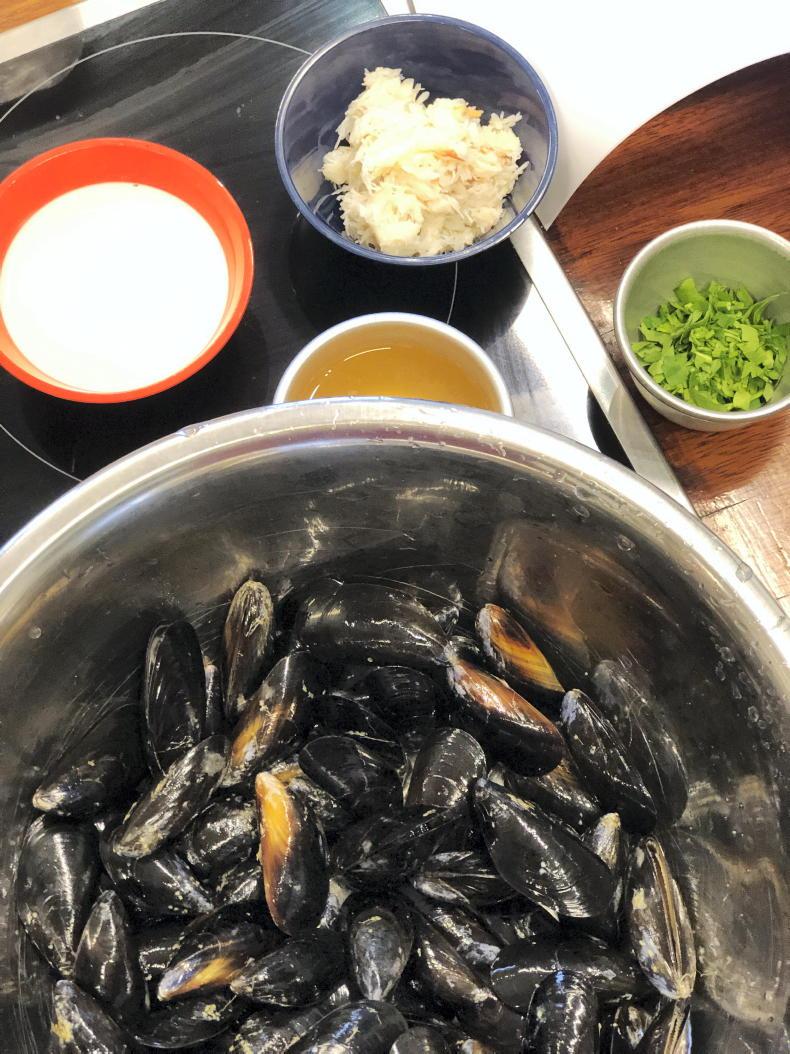
Cockles and mussels.
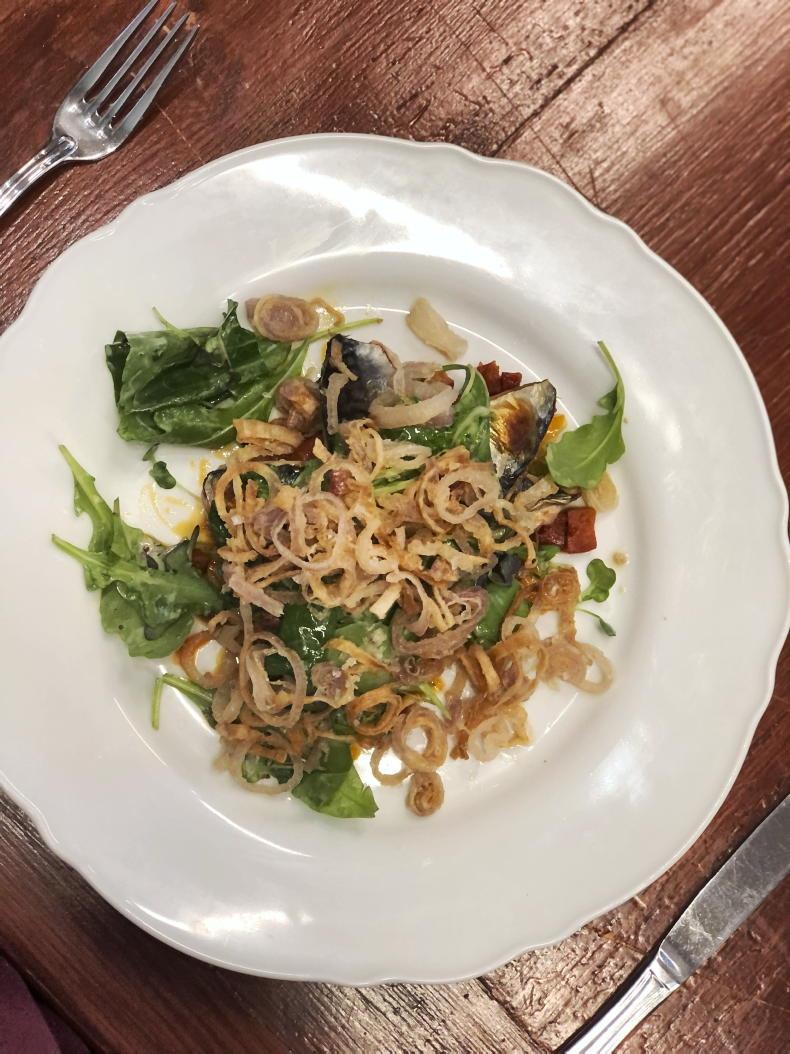
The main course of mackerel, chorizo and leak, roast potato and deep fried onions.
We prepare our mussels (some cockles are thrown in for good measure) first and eat those before starting on the main course.
The sauce is simple but divine, so much so there is a real danger we will fill up before we get to our own catch of the day.
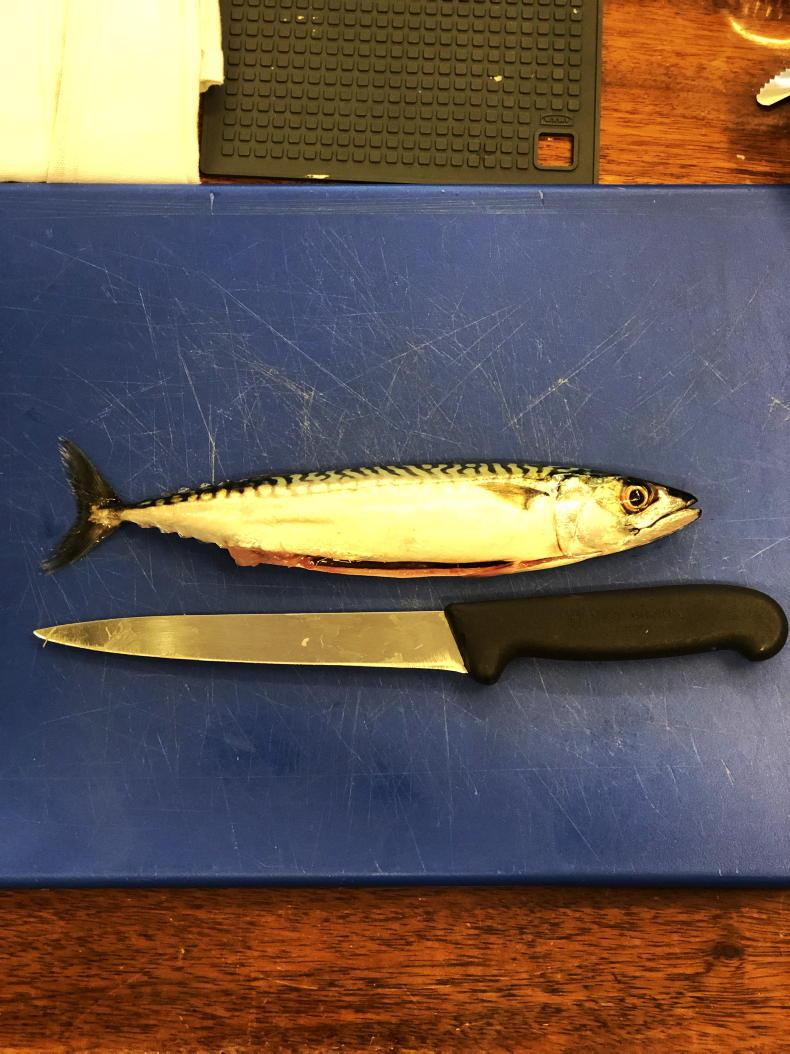
Learning how to fillet a mackerel.
Pierre expertly guides us through the art of filleting – leaving some actual meat behind being the aim of this exercise.
For those of us keen to continue perfecting our technique, Sarah’s aforementioned “backups” are produced.
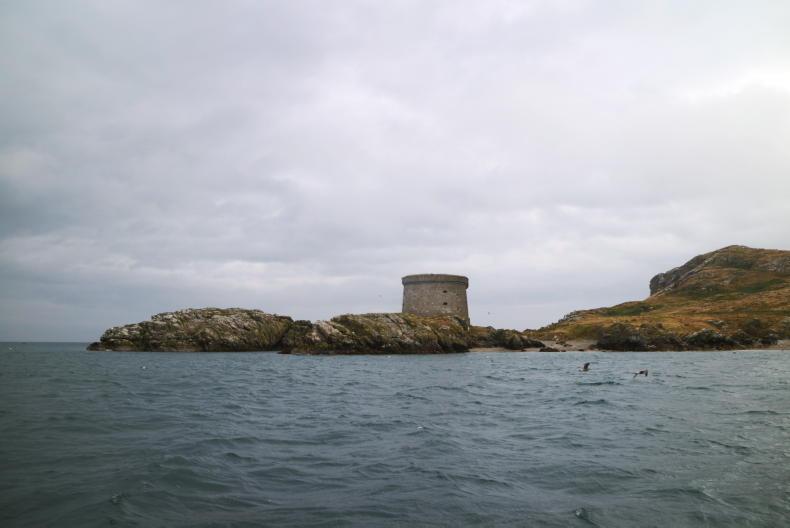
Howth Cookery School in North Co Dublin is based in the original 18th century kitchen of Howth Castle.
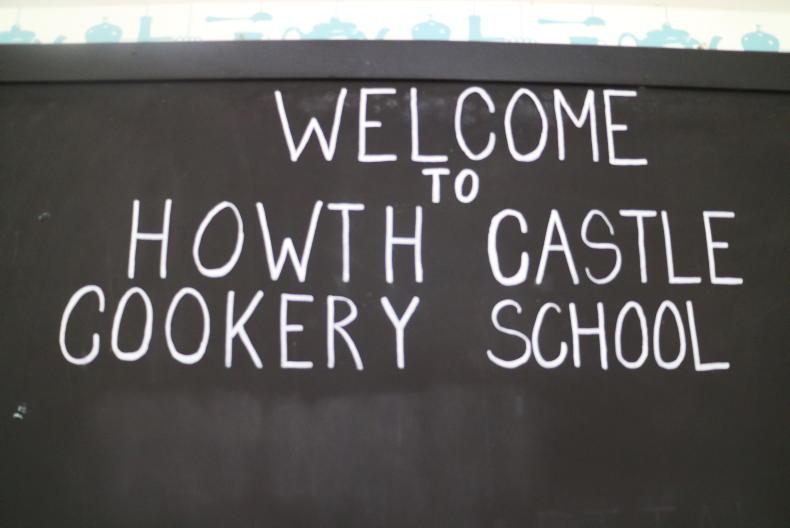
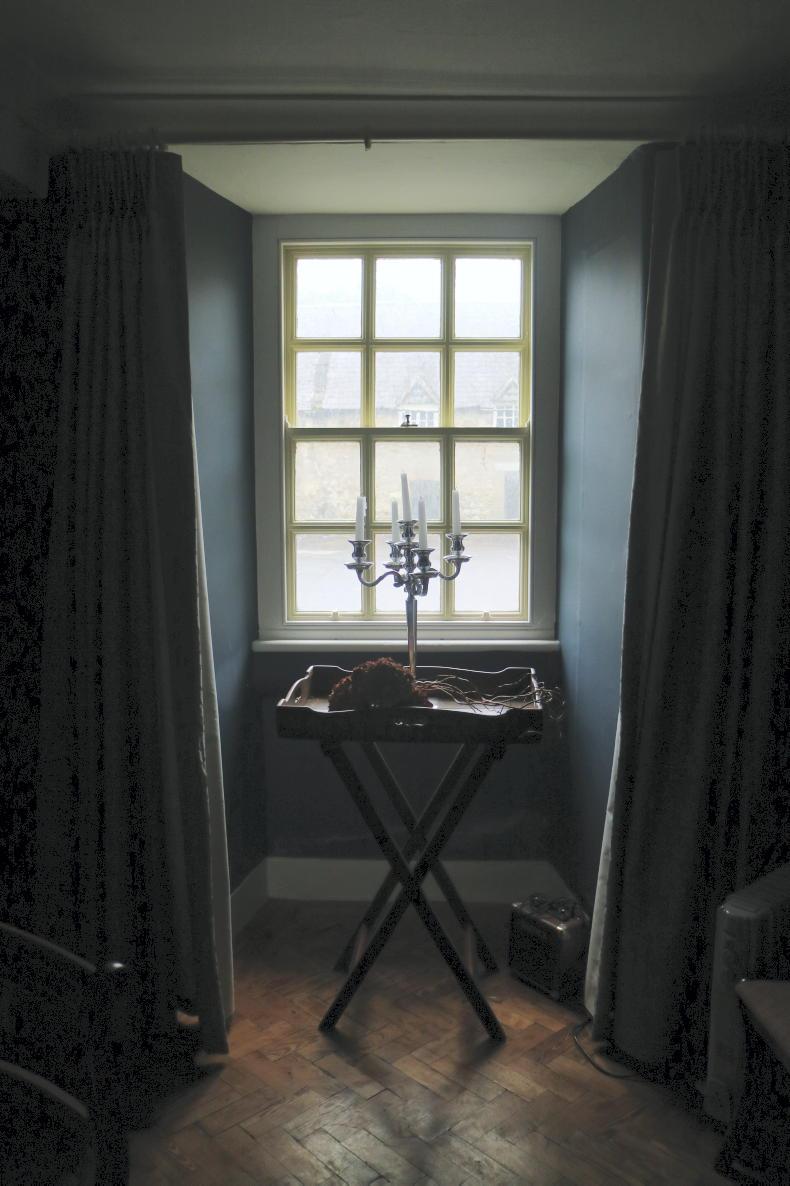
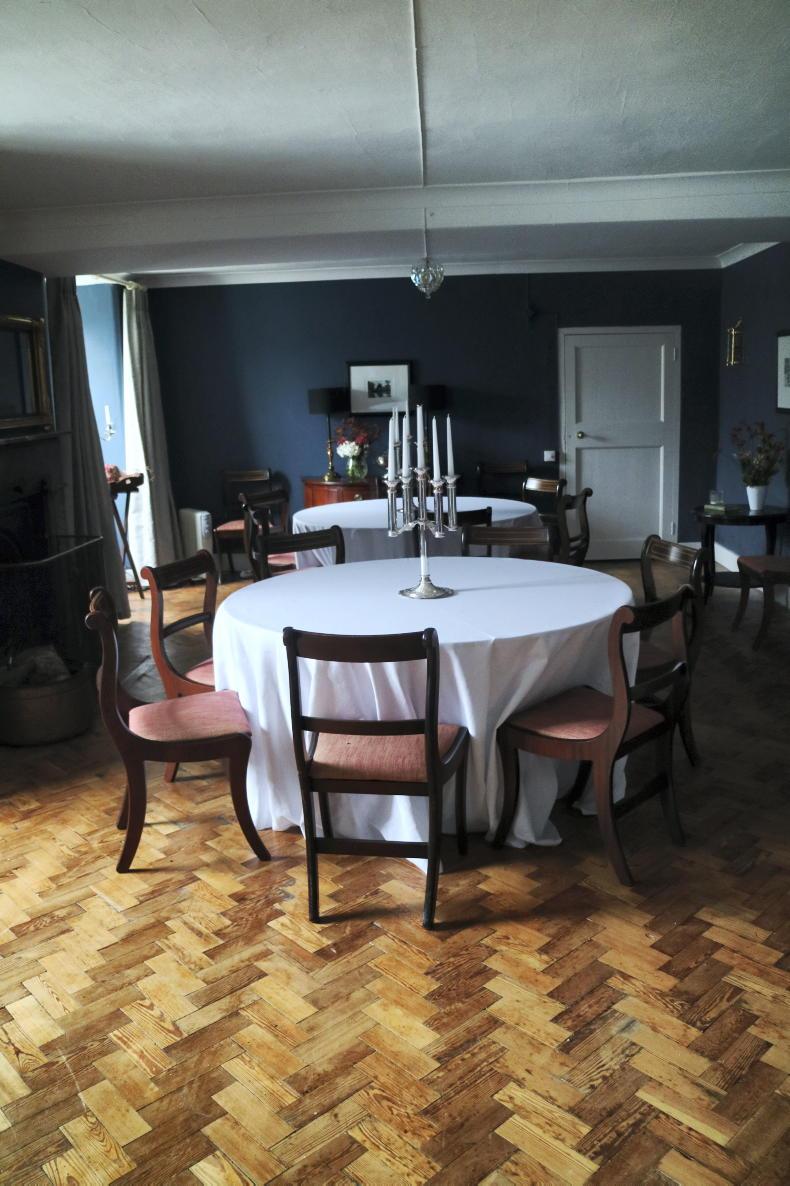
Everyone gathers around the grill to inspect the fish, nervous the effort would be wasted on a failure to time-keep before plates are piled high with salad, fish, crispy potatoes and deep fried onion deliciousness. Our group, now totally comfortable, gather at the banquet table to celebrate what has been a truly memorable day.
For details of upcoming classes, visit
www.howthcastlecookeryschool.ie
A “Doyle from Howth”, skipper David’s family are long established here. Sarah referred to him as “a great character” which was no word of a lie.
“Fishing here 40 years, used to do trawlers and crab boats but that’s all gone a bit different so went into the charter. This, people get a bit of craic out of it, they like eating and cooking and drinking with us.
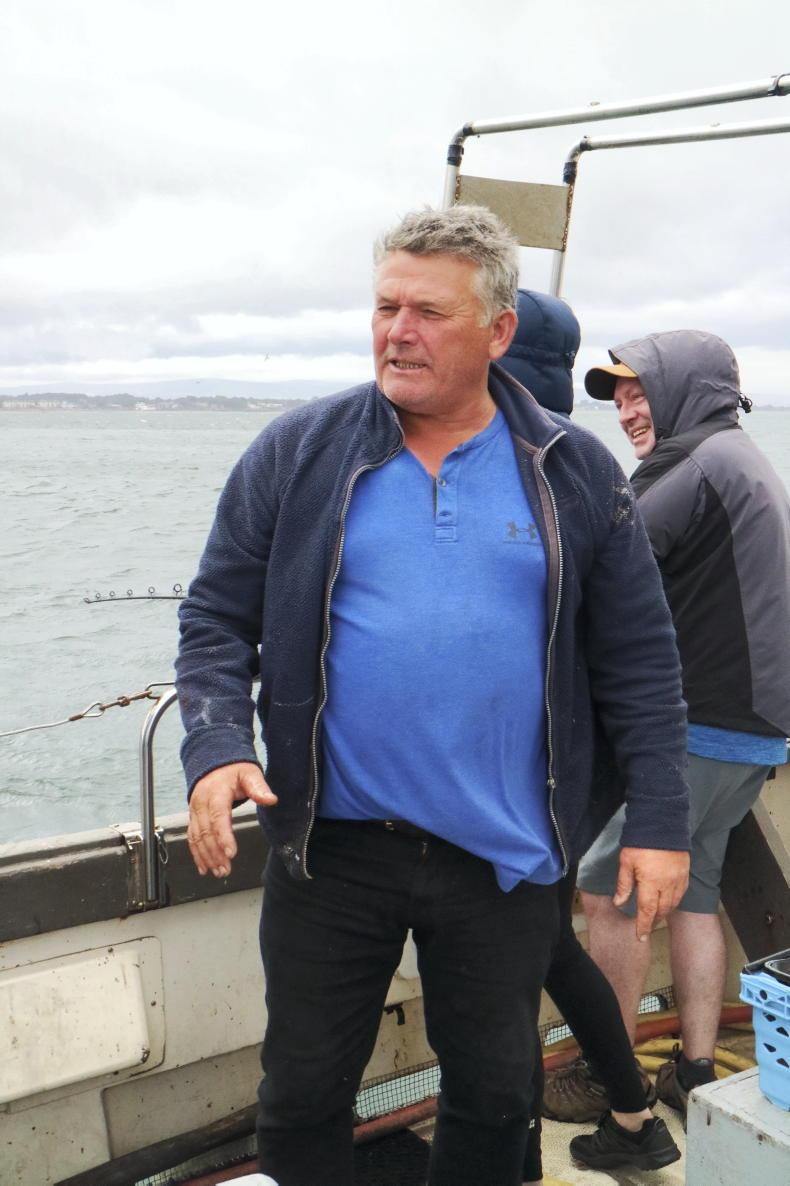
Skipper David Doyle was an expert guide with 40 years’ experience in the waters around Howth.
“We don’t actually need a licence to fish because we’re not a commercial fishing boat. Commercial boats are banned the last 15 years so there is way more fish now. This was due to the cod recovery programme. There is no in-shore fishing now within 10 miles of here. Wasn’t good for me then but it’s good for me now.”
When there is no fishing going on, David does tours of Ireland’s Eye. He explains the heritage. “Back in the day monks lived on the island and then the Vikings came along and chop chop! That was the end of them. There is a little church ruin and a Martello Tower.”
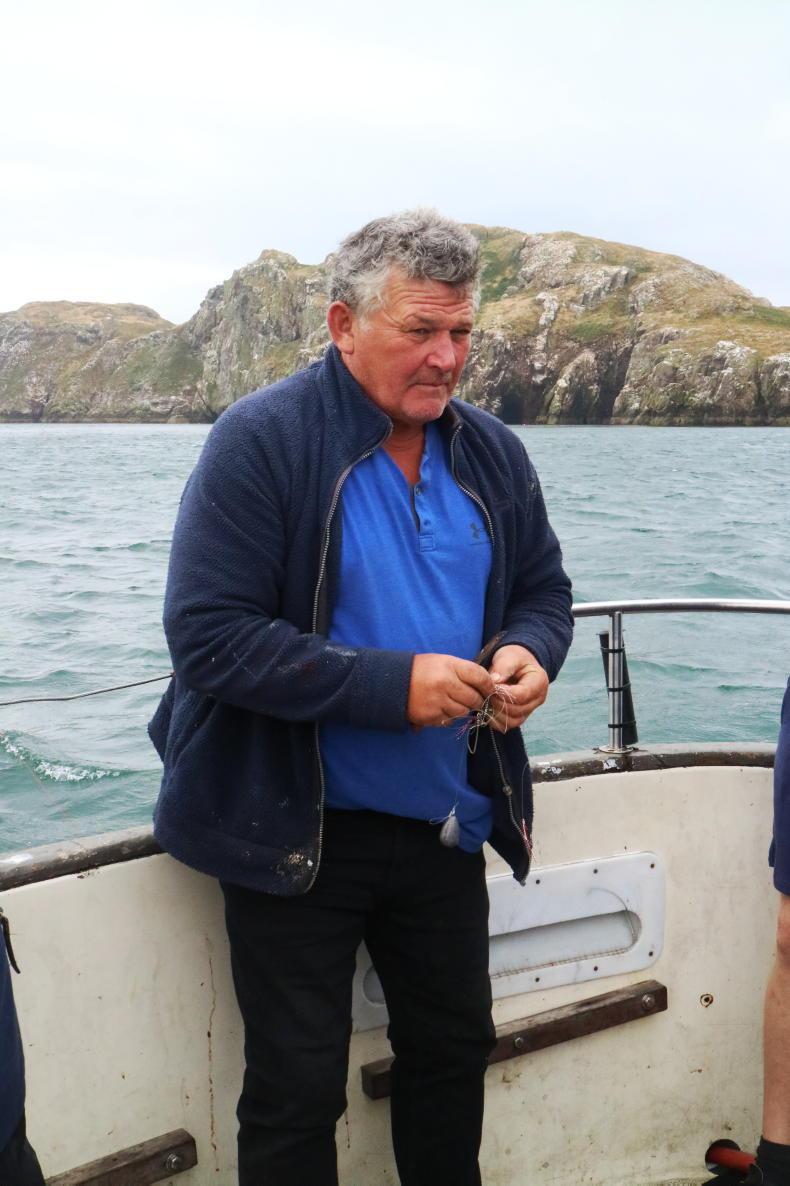
The town has moved from fish and net factories to tourism now, over one million tourists a year. David says he doesn’t know what they do bar wander all over the place, but says, “if the fishing goes, it will be a different town. There is still a good fleet here that travels the country.”
The price of diesel has doubled for David. He says that he has not raised prices, afraid that customers will not come back. Pointing to the harbour he laments the loss of Irish commercial fishing.
“Politicians stand on the coast looking inland, I think that commercial fishing is screwed. You see them two big boats, them 40ft trucks – loading up there? They are Belgian. The Irish are out of quota but the Belgians aren’t. It’s like you, a farmer, watching someone else farming your land ... bet you’d be pissed off!”
Deer park estate and Ireland’s Eye
The Deer Park Estate and Ireland’s Eye are part of the property portfolio of Tetrarch Capital, owners of the Citywest Hotel and Mount Juliet. Planning has been sought for a new 142-bed hotel, affordable housing, golf course and public park.
Read more
No longer a deep dark wood
When high fashion meets high farming
There they were, swimming along, not far from the boat – a pair of puffins.
Our group leaned over the side or stood on toes, craning our necks to catch a glimpse. But there was no real need as the couple swam around us, seemingly happy to lap up the attention.
We had just cast our lines into the sea off Ireland’s Eye, an uninhabited island in Howth Harbour, home to many species of nesting birds. Aside from the puffins, there are guillemots, gannets, razorbills, fulmars and gulls. Grey seals are plentiful, as are our prey – mackerel.
What has “landed” (excuse the pun) Irish Country Living in this situation? The opportunity to “catch and cook” with Howth Cookery School in Dublin. The school itself is in the original 18th century kitchen of Howth Castle. On arrival, I am greeted by chef Sarah Hughes, slathering butter on to fresh bread roles and piling thick slices of belly bacon on top. A plate of pastries and a welcome hot coffee appear in front of me, and answering my questions, she effortlessly welcomes the other guests while continuing to pack those rasher rolls for the trip ahead.
Catch and cook
The cookery school mainly does classes for the public but also private and corporate groups. Today’s adventure, “catch and cook”, is half fishing, half cooking. In simple terms: “We will go out for a couple of hours around the bay and hopefully we’ll catch something” but shrewdly Sarah tells me: “If not, we have backups in the fridge.”
Sarah has done lots of different things. “I’ve worked in cafes and restaurants, I’ve taught in other cookery schools. I am from Limerick and spent all my summers in Kerry. So I have a huge grá for fish and all things sea-related. I do nearly all of the fish classes. Howth is a fantastic place for fish, a proper working port, it’s not window dressing,” she explains.
Ethos
The ethos is to teach home cooks to cook better. “We want to get people cooking and keep people cooking and doing new things,” she says.
In relation to the type of “student”, Sarah says: “You never know who is coming in so we have learned over the years to develop recipes that some people can do little bits of and can get help and then more technical chefs get an opportunity to do things from scratch. For the majority, it’s very much a social thing. It’s great fun and we try to keep it that way.”
Who attends? “It’s interesting,” Sarah responds. “All the stereotypes aside, your barbecue classes – lots of men, your fish classes – lots of men. Any of the curries or beers classes – lots of men. Groups of women come along to the Spanish or French food classes and then the Vietnamese and sushi classes, we find young people come along too.
“We use as much Irish food as we can, meat and fish always but we get as much of our vegetables from local organic producers as we can, but it can be hard. It doesn’t work all the time for seasonality. But people are understanding it [seasonality] more. We work menus for spring, summer, autumn and winter. That’s what the customer demand is for. The customer doesn’t want to be cooking with strawberries or doing light dishes in the middle of winter. That’s when they want comforting food.”
With time pressing on us and the bacon rolls done, I ask Sarah what we are hoping to catch? “We’re not really sure with the time of year – but that makes it a bit exciting. But oh God, we’d love mackerel.”
To sea
On the boat, the atmosphere is as Sarah predicted “good craic”, and over a local Hope beer (we have the Grunt) and a satisfying bacon sandwich, we toast each other’s success. Such is this catching prowess that Sarah and David Doyle, our skipper, start the filleting process on the boat. The two hours fly by, as does the aforementioned bird life.

Chef Sarah Hughes and skipper David Doyle start to fillet the fish on board Davids charter boat.

A beer on board: local brew Hope Grunt beer was the drink of choice on board (there was also coffee but ...)

Pierre Heyraud showed us how to fillet our mackerel

Casting a line near Ireland’s Eye in Howth Harbour.

The first catch of the day was very exciting for Amii Mckeever but so many more followed.
Before long, we are back in the cookery school and Sarah hands us over to expert tutor, and no nonsense chef, Pierre Heyraud, who takes us through the menu. Paired off in groups of two in the grand kitchen, there is no rush or hurry.

Cockles and mussels.

The main course of mackerel, chorizo and leak, roast potato and deep fried onions.
We prepare our mussels (some cockles are thrown in for good measure) first and eat those before starting on the main course.
The sauce is simple but divine, so much so there is a real danger we will fill up before we get to our own catch of the day.

Learning how to fillet a mackerel.
Pierre expertly guides us through the art of filleting – leaving some actual meat behind being the aim of this exercise.
For those of us keen to continue perfecting our technique, Sarah’s aforementioned “backups” are produced.

Howth Cookery School in North Co Dublin is based in the original 18th century kitchen of Howth Castle.



Everyone gathers around the grill to inspect the fish, nervous the effort would be wasted on a failure to time-keep before plates are piled high with salad, fish, crispy potatoes and deep fried onion deliciousness. Our group, now totally comfortable, gather at the banquet table to celebrate what has been a truly memorable day.
For details of upcoming classes, visit
www.howthcastlecookeryschool.ie
A “Doyle from Howth”, skipper David’s family are long established here. Sarah referred to him as “a great character” which was no word of a lie.
“Fishing here 40 years, used to do trawlers and crab boats but that’s all gone a bit different so went into the charter. This, people get a bit of craic out of it, they like eating and cooking and drinking with us.

Skipper David Doyle was an expert guide with 40 years’ experience in the waters around Howth.
“We don’t actually need a licence to fish because we’re not a commercial fishing boat. Commercial boats are banned the last 15 years so there is way more fish now. This was due to the cod recovery programme. There is no in-shore fishing now within 10 miles of here. Wasn’t good for me then but it’s good for me now.”
When there is no fishing going on, David does tours of Ireland’s Eye. He explains the heritage. “Back in the day monks lived on the island and then the Vikings came along and chop chop! That was the end of them. There is a little church ruin and a Martello Tower.”

The town has moved from fish and net factories to tourism now, over one million tourists a year. David says he doesn’t know what they do bar wander all over the place, but says, “if the fishing goes, it will be a different town. There is still a good fleet here that travels the country.”
The price of diesel has doubled for David. He says that he has not raised prices, afraid that customers will not come back. Pointing to the harbour he laments the loss of Irish commercial fishing.
“Politicians stand on the coast looking inland, I think that commercial fishing is screwed. You see them two big boats, them 40ft trucks – loading up there? They are Belgian. The Irish are out of quota but the Belgians aren’t. It’s like you, a farmer, watching someone else farming your land ... bet you’d be pissed off!”
Deer park estate and Ireland’s Eye
The Deer Park Estate and Ireland’s Eye are part of the property portfolio of Tetrarch Capital, owners of the Citywest Hotel and Mount Juliet. Planning has been sought for a new 142-bed hotel, affordable housing, golf course and public park.
Read more
No longer a deep dark wood
When high fashion meets high farming























SHARING OPTIONS